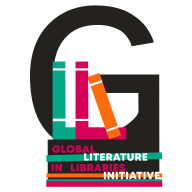Today, the International Prize for Arabic Fiction — the most glittery and high-profile prize for Arabic literature — put out its 2017 longlist:
Here, we look at several of the top Arabic literature prizes and what they might mean for librarians, instructors, translators, publishers, and readers looking for new work from Arabic.
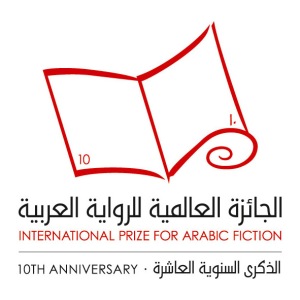 The International Prize for Arabic Fiction, now in its tenth year, is run with the support of the Booker Prize Foundation in London and funded by Abu Dhabi Tourism & Culture Authority in the Emirates. It’s had some hits and misses in the first ten years, and has tended to go with “big books” rather than challenging fiction. There are other controversies, over gender and the weight of “geographic diversity”; the prize has probably generated as much controversy as it’s thrown light.
The International Prize for Arabic Fiction, now in its tenth year, is run with the support of the Booker Prize Foundation in London and funded by Abu Dhabi Tourism & Culture Authority in the Emirates. It’s had some hits and misses in the first ten years, and has tended to go with “big books” rather than challenging fiction. There are other controversies, over gender and the weight of “geographic diversity”; the prize has probably generated as much controversy as it’s thrown light.
This prize offers publishers a subsidy for English translation, so many of its titles are in English.
Last year’s winner of the Prize was Destinies: Concerto of the Holocaust and the Nakba by Rabai al-Madhoun, and it will be released in English translation by Hoopoe Fiction in 2018. Hoopoe also recently published Mohamed Rabie’s Otared (trans. Robin Moger), from the prize’s 2016 shortlist, and will be bringing out Sinan Antoon’s shortlisted Ya Mariam as Baghdad Eucharist (trans. Maia Tabet) in April. They also have rights to Mohamed Abdelnaby’s widely praised In the Spider’s Room, on the 2017 longlist.
Other previous IPAF winners include Shukri Mabkout’s The Italian (2015); Ahmed Saadawi’s Frankenstein in Baghdad (2014), forthcoming in translation by Jonathan Wright in 2018; Saud Alsanousi’s The Bamboo Stalk (2013), translated into English by Jonathan Wright; Rabee Jaber’s The Druze of Belgrade (2012); Mohammed Achaari’s The Arch and the Butterfly and Raja Alem’s The Dove’s Necklace, co-winners, both in English translation (2011); Abdo Khal’s Throwing Sparks (2010), translated into English by Maia Tabet and Michael Scott; Youssef Ziedan’s Azazeel (2009), translated into English by Jonathan Wright; and Bahaa Taher’s Sunset Oasis (2008), translated into English by Humphrey Davies.
Of the translated winners, the first for your list should be Destinies, Frankenstein in Baghdad, and The Dove’s Necklace, by the prize’s only woman (co-)winner.
Forthcoming on GLLI tomorrow: An excerpt of Mohamed Rabie’s Otared, trans. Robin Moger.
#
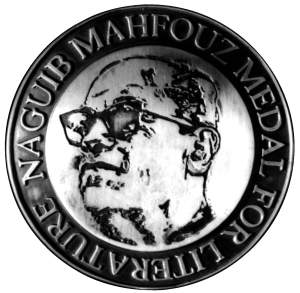 The Naguib Mahfouz Medal for Literature is an old-timer among pan-Arab literary prizes. It launched back in 1996, less than a decade after Mahfouz’s Nobel, and nearly all its winners have been published in English translation by its sponsor, AUC Press. It’s awarded each year on or around Mahfouz’s birthday, December 11. The prize does not offer a longlist or shortlist, so it’s not possible to know any of the books the judges are considering, but it’s awarded many fantastic titles, incuding Bensalem Himmich’s The Polymath, trans. Roger Allen; Hoda Barakat’s The Tiller of Waters, trans. Marilyn Booth; and Mourid Barghouti’s classic I Saw Ramallah, trans. Ahdaf Soueif.
The Naguib Mahfouz Medal for Literature is an old-timer among pan-Arab literary prizes. It launched back in 1996, less than a decade after Mahfouz’s Nobel, and nearly all its winners have been published in English translation by its sponsor, AUC Press. It’s awarded each year on or around Mahfouz’s birthday, December 11. The prize does not offer a longlist or shortlist, so it’s not possible to know any of the books the judges are considering, but it’s awarded many fantastic titles, incuding Bensalem Himmich’s The Polymath, trans. Roger Allen; Hoda Barakat’s The Tiller of Waters, trans. Marilyn Booth; and Mourid Barghouti’s classic I Saw Ramallah, trans. Ahdaf Soueif.
The December 2016 prize went to Adel Esmat’s Tales of Yusuf Tadros, a story of the life of a Coptic artist who eventually chooses exile.
The 2015 prize, meanwhile, went to acclaimed Lebanese writer Hassan Daoud’s No Road to Paradise, forthcoming this spring.
Forthcoming on GLLI next week: An excerpt from Daoud’s No Road to Paradise.
#
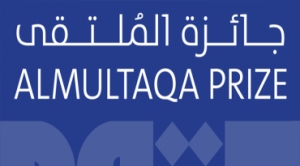 Almultaqa Prize for the Arabic Short Story is a newcomer to the scene, but it landed with a bang, presenting its inaugural prize to Mazen Maarouf’s Jokes for the Gunmen. This prize also offers assistance to publishers who want to bring out its winners in English, and provides support to the short-story form, which has been thrown into the shadow of late, with the majority of attention going to the novel.
Almultaqa Prize for the Arabic Short Story is a newcomer to the scene, but it landed with a bang, presenting its inaugural prize to Mazen Maarouf’s Jokes for the Gunmen. This prize also offers assistance to publishers who want to bring out its winners in English, and provides support to the short-story form, which has been thrown into the shadow of late, with the majority of attention going to the novel.
Maarouf was previously known as a poet — before this collection — and, while you wait for the collection in English, you can read some of his poems online: “DNA,” translated by Kareem James Abu-Zeid and Six Poems, translated by Jasim Mohamed. His short story “The Boxes” was also included in the excellent collection Beirut Noir, edited by Iman Humaydan and translated by Michelle Hartman.
#
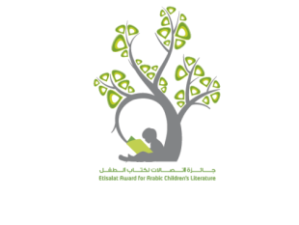 The Etisalat Prize for Arabic Children’s Literature is another new prize, awarded each November at the opening of the Sharjah International Book Fair. Of the shortlisted titles, only one has thus far made it into English translation: Code Name: Butterfly by Ahlam Bsharat, translated by Nancy Roberts. We hope to see many more of the titles in English, particularly Taghreed Najjar’s moving Sitt al-Kol, based on the true story of a teen fisherwoman in Gaza, and the inaugural winner, Noura Noman’s Ajwan.
The Etisalat Prize for Arabic Children’s Literature is another new prize, awarded each November at the opening of the Sharjah International Book Fair. Of the shortlisted titles, only one has thus far made it into English translation: Code Name: Butterfly by Ahlam Bsharat, translated by Nancy Roberts. We hope to see many more of the titles in English, particularly Taghreed Najjar’s moving Sitt al-Kol, based on the true story of a teen fisherwoman in Gaza, and the inaugural winner, Noura Noman’s Ajwan.
Code Name: Butterfly is a necessary addition for any library’s YA collection, as is Fatima Sharafeddine’s Faten, which was released in Arabic before the advent of the Etisalat Prize, but won the 2010 Beirut Book Fair Prize for “Best Novel.”
#
Other major pan-Arab prizes include the Sheikh Zayed Book Award, which is — like the International Prize for Arabic Fiction — awarded every year at the Abu Dhabi Book Fair, in April; the Qatar-based Katara Prize, although this prize unfortunately seems to carry out and publish their own English translations of the books; the Moroccan Mohamed Zafzaf Prize, which recently went to acclaimed Palestinian novelist Sahar Khalifeh, who is the judging chair for this year’s International Prize for Arabic Fiction.
